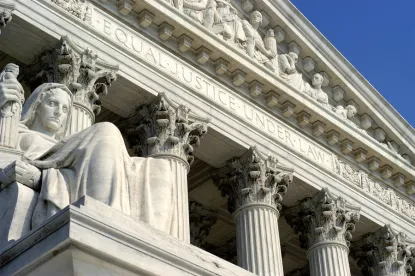On June 1, 2020 the United States Supreme Court issued a unanimous decision in GE Energy Power Conversion Fr. SAS, Corp. v. Outokumpu Stainless USA, LLC, No. 18-1048, 2020 WL 2814297 (U.S. June 1, 2020), holding that the United Nations Convention on the Recognition and Enforcement of Foreign Arbitral Awards (New York Convention) does not conflict with the enforcement of arbitration agreements by non-signatories through domestic equitable estoppel doctrines.
The Supreme Court’s decision resolved a federal circuit split and reinforced the pro-arbitration stance of U.S. courts. In 2008 and 2012 respectively, the First and Fourth Circuits held that non-signatories to international arbitration agreements could enforce those agreements against signatories through the doctrine of equitable estoppel. See Sourcing Unlimited, Inc. v. Asimco Int’l, Inc., 526 F.3d 38, 47-8 (1st Cir. 2008); Aggarao v. MOL Ship Mgmt. Co., 675 F.3d 355, 373 (4th Cir. 2012). In 2017, the Ninth Circuit took a different path, holding that the New York Convention does not allow non-signatories to compel arbitration. Yang v. Majestic Blue Fisheries, LLC, 876 F.3d 996, 999 (9th Cir. 2017). The Ninth Circuit held that the New York Convention does not allow non-parties or non-signatories to an arbitration agreement to compel arbitration. Id. at 1001.
The underlying dispute in GE Energy Power Conversion Fr. SAS, Corp. involved three contracts between ThyssenKrupp Stainless USA, LLC and F.L. Industries, Inc. for construction of cold rolling mills in Alabama. 2020 WL 2814297, at *2. F.L. Industries entered into a subcontractor agreement with GE Energy Power Conversion France SAS, Corp. (“GE”) for GE to design, manufacture, and supply motors for the cold rolling mills. Id. at *3. GE delivered nine motors to the mills, and Outokumpu, who acquired ownership of the plant where the motors were installed, claimed that GE’s motors failed, causing substantial damages. Id.
Outokumpu filed suit against GE in Alabama, and GE removed the case to federal court and moved to compel arbitration. Id. The district court granted GE’s motion to dismiss and compel arbitration; however, the Eleventh Circuit reversed. Id. Consistent with the Ninth Circuit’s ruling in Yang, the Eleventh Circuit held that as a non-signatory, GE did not satisfy the New York Convention’s requirement that the parties actually sign an agreement to arbitrate their disputes, and so GE could not compel arbitration. See id. The Eleventh Circuit also held that GE as a non-signatory could not rely on state-law equitable estoppel doctrines to enforce the arbitration agreement because equitable estoppel conflicts with the New York Convention’s signatory requirement. Id.
The Supreme Court looked to Article II(3) of the New York Convention rather than Article II(1) and (2) (“signed by the parties”) as the Eleventh Circuit had, because Article II(3) alone addresses enforcement of arbitration agreements. See id. at *5. The Supreme Court explained Article II(1) and (2) “address the recognition of arbitration agreements, not who is bound by a recognized agreement.” Id. at *7. The Court found that while “Article II(3) provides that arbitration agreements must be enforced in certain circumstances, . . . it does not state that arbitration agreements shall be enforced only in the identified circumstances.” Id. The Court explained that the provisions of Article II contemplate that domestic law will fill in the gaps in the New York Convention, so it would be unnatural to interpret Article II(3)’s silence regarding the use of domestic doctrines, like equitable estoppel, as precluding the use of domestic law to enforce arbitration agreements. See id.
The Supreme Court also considered (1) the negotiating and drafting history of the New York Convention; and (2) decisions by courts of other Convention countries. Both confirmed the Court’s textual interpretation of the New York Convention. See id. at *6. Justice Sotomayor authored a concurring opinion, noting that the application of domestic doctrines, such as equitable estoppel, must be rooted in the “consent to arbitrate” because this limitation is a “basic precept” of the FAA. Id. at *8 (Sotomayor, J., concurring).
On June 8, 2020, the Supreme Court cited GE Energy Power Conversion Fr. SAS, Corp. in an order vacating the Ninth Circuit’s decision in Setty v. Shrinivas Sugandhalya LLP, 771 Fed. App’x 456 (9th 2019), in which the circuit court held that a non-signatory could not compel arbitration under the New York Convention or the FAA. See Shrinivas Sugandhalya LLP v. Setty Balkrishna, No. 19-623, 2020 WL 3038281 (U.S. June 8, 2020). The Supreme Court remanded the case to the Ninth Circuit for further consideration in light of GE Energy Power Conversion Fr. SAS, Corp. Id.




 />i
/>i

